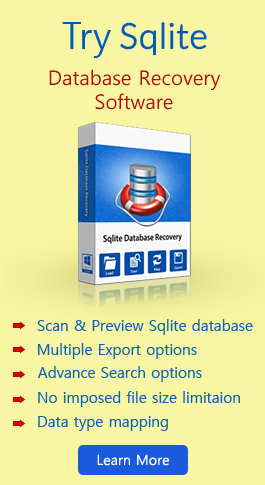Find Out Why and Where To Use Sqlite Database
In our last blog we discussed the Database File structure of Sqlite. Know this time we are picking up an interesting and simple topic that is where to use Sqlite database. The Sqlite and SQL may appear similar but are poles apart from a technical standpoint. Mysql, SQL Server, and similar others are complete Relational Database Management Systems. Whereas, Sqlite is an open source sequel engine, quick and simple at performance unlike the RDBMS. However, it would be wrong to make an assumption about Sqlite as only a platform for development and testing purposes.
Apparently, the engine is completely suitable to work for websites that receive around 100,000 hits every day on an approximate value. Moreover, the maximum storage potential of Sqlite is a whopping 140 TB of database simultaneously, it still works quicker than most RDBMSs.
Perks Of Using Sqlite Database Over Any RDBMS
Though, unlike a full-fledged RDBMS, Sqlite requires no maintenance or configuration which makes it a convenient and independent choice. But, besides these, there are some other surpassing technical privileges that using Sqlite database has over any other RDBMS.
1. Mobility: The storage of complete database and other essential data is done in a normal file type in the host file system. Thus, the deployment of a separate server is not required, which as a result, cuts down the slow intercommunication procedure.
2. Cross Platform: All the multibyte values of the integer are stored by Sqlite in big-endian order, i.e. placing the most fundamental byte first. Database can safely be moved across different platforms.
3. Reverse Compatibility: Databases of Sqlite are built with backward compatibility that allows the read/write procedure to take place on a database of the version on a new version.
4. High on Performance: Sqlite is lite on the configuration part and being entirely internal it makes up for platform offering high performance, especially speed. The Sqlite serves portability in relation with platform and language, speed, reduced memory footprint, and simplicity; relatively more ideally.
5. Cross Platform: Let alone Windows, Mac, Linux; Sqlite database encompasses smartphone OS Android, Windows, and iOS. This enhances database portability to varied systems.
6. Self-Reliant: All transactions of the database have ACID property, i.e. they remain Consistent, Isolated, and Durable despite of power brownout or system crash.
Where To Use Sqlite Database?
Though the flexibility Sqlite offers is quite apparent by now, but only the correct implementation of its potential shall give satisfactory results. Thus, here is a list of options where using of Sqlite database would prove benefitting:
1. Embedded Devices: Self-reliant nature of Sqlite supports its usage on devices which do not require human support for carrying out operations. Thus, cell/smart phones, televisions, home appliance, games, aircraft, drones, cameras, medical device, and internet of things are relevant options so in these categories we can use Sqlite database.
2. Websites: Most websites on total receive traffic ranging from low to medium and not very high. The Sqlite in that case is capable of handling that kind of web traffic. It entirely depends on the intensity of a website making use of its database. 400-500K of HTTP requests on a daily basis with approximately 20% of dynamic pages using the database can be dealt, as proven by the testing of Sqlite for website.
3. Server-Side Operations: This kind of operation stores and processes client data onto a server which is viewable by multiple other clients. As a result load on the client is shed down to a greater extent. This way primary server still remains, but along with an individual Sqlite database for every user. As a result, each connection is liable to use only one Sqlite database while the server still handles simultaneous connections at a time.
4. The File Format for Applications: The complete database is stored within a cross platform disk file by Sqlite, making it a suitable file format for desktop applications. This may include, analysis tools for finance, Computer Aided Design package, applications for record maintenance, system controlling versions, media editing & classification suites, and more. The benefit of it is reduced cost, enhanced performance & reliability, and reduced complications.
Some Famous Platforms that Using Sqlite database:
Benefits and areas of using Sqlite database clearly reason at the technical aspects, here is an example of some of the notable names in the industry that have Sqlite implemented as a standard for their.
Products/applications: Adobe AIR, Reader, Photoshop Lightroom, flight software for Airbus, Apple products and functions, Mozilla Firefox, Skype Messenger, Python, McAfee, and many more.
CONCLUSION
Shortcomings of Sqlite only appear when high end read/write concurrency is needed. The database engine is fast but only permits one writer at once. In addition to that, usually high latency of the file system may prove inconvenient in case multiple clients necessitate accessing one data at the same time. Also, despite of a strong backward compatibility, there are certain features that an older version of the database engine may not understand if implemented on a database created using Sqlite 3.0.0. Other than that, Sqlite promotes efficiency, simplicity, economy, reliability, and independence by providing local storage of data for devices/individual apps.



